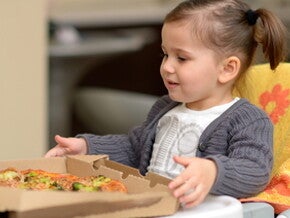
Essential Nutrients Every Child Needs!
What Are The Essential Vitamins And Minerals For Childhood?
IMPORTANT NOTICE: The World Health Organization (WHO) recommends exclusive breastfeeding for the first 6 months and continued breastfeeding for as long as possible. Growing up milks are formulated to meet nutrition needs of healthy young children older than 1 year and should not be fed to infants.
Your toddler needs lots of essential vitamins and nutrients to thrive, develop and stay healthy and active.
To help your little munchkin get his daily nutritional requirements, we advise you to supercharge his healthy well-balanced with each of these crucial nutrients:
Vitamin A
Vitamin A is vital for maintaining healthy eyes and vision. Foods that contain high levels of vitamin A include: carrots and sweet potatoes.
Vitamin C
Vitamin C provides the necessary boost to the immune cells, body tissues and antibody production. Foods that contain high levels of vitamin C include: oranges, mangos, strawberries and tomatoes.
Vitamin D
Vitamin D is known to help the body absorb calcium and phosphorus found in a variety of foods, and thus builds and maintains strong bones. Good Food sources of vitamin D include: eggs, tuna and fortified milk.
Vitamin E
Vitamin E triggers the metabolism to inhibit free radicals and oxidative stress. Foods that contain high levels of vitamin E include: almonds and spinach.
Fatty Acids
Fatty acids are absolutely necessary for the cell production and the proper functioning of the nervous system and the brain. Good Food sources of fatty acids include: avocados and salmon.
Magnesium
Magnesium is a great source of energy for the body. Foods that contain high levels of magnesium include: brown rice, legumes and tofu.
Potassium
Potassium helps regulate blood pressure, heart rate and muscle functions. Foods that contain high levels of potassium include: broccoli, bananas and kale.
Zinc
Zinc is extremely important for cell division and growth. It also plays a role in stimulating the immune function. Good Food sources of zinc include: red meat and poultry.
Calcium
Calcium is necessary to build strong bones and prevent osteoporosis and other age related conditions. Foods that contain high levels of calcium include: dairies and green leafy vegetables.
Iron
Iron is critical for the production of hemoglobin that is responsible for oxygen transport throughout the body. Foods that contain high levels of iron include: leafy vegetables, red meat and legumes.
Those were the essential nutrients that each and every child should be getting on a daily basis. Make sure your tot gets enough food containing these vitamins and minerals, in addition to other important nutrients, like fibers, proteins and vitamin B complex.
Read More: What To Do When Your Child Won’t Drink Milk?




















